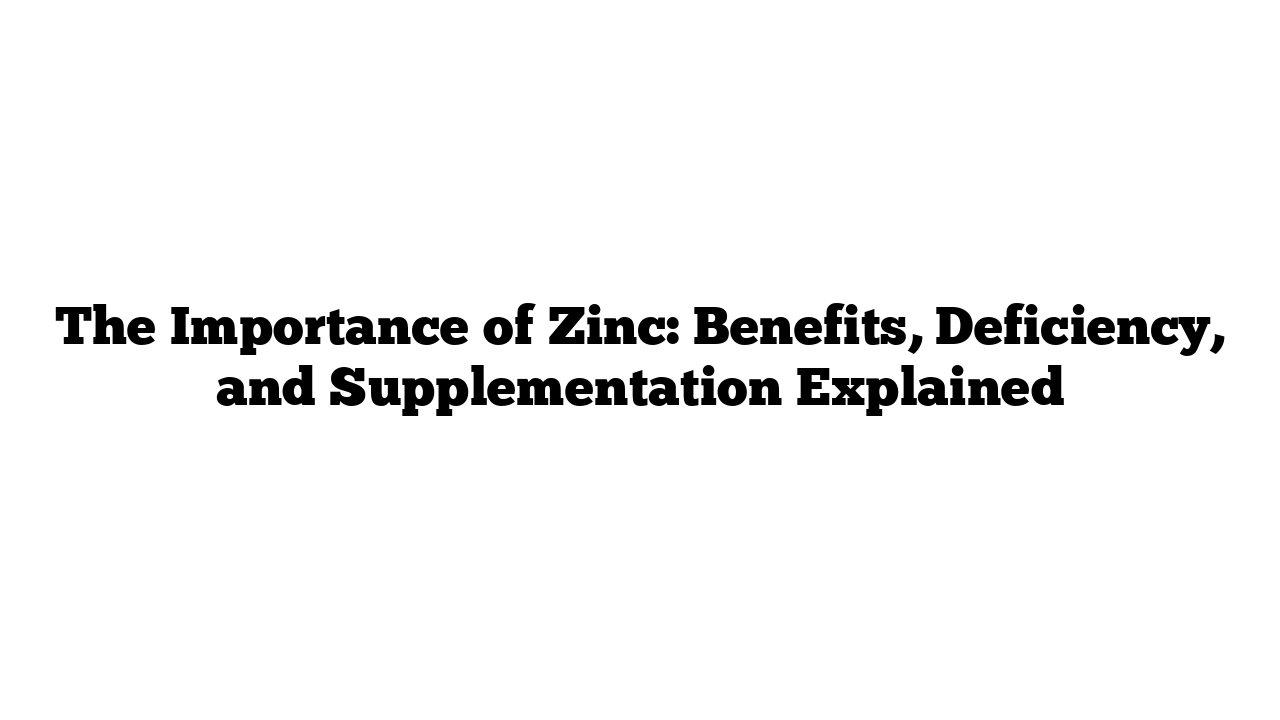Zinc is one of those essential nutrients that plays a crucial role in maintaining good health. It’s involved in countless processes in your body, but many people don’t realize just how vital it is. Whether you’ve been wondering if you should take zinc supplements or simply want to understand its health benefits, this article will guide you through it all.
What is Zinc and Why is it Important?
Zinc is an essential trace element, meaning your body cannot produce or store it on its own. You need to get zinc through your diet, and it plays a major role in various chemical reactions within your body.
Zinc is critical for your immune system, the healing of wounds, and even the growth of your body. It is also involved in vital functions like maintaining healthy skin, vision, and taste and smell.
The most common sources of zinc are meat and fish, but you can also find it in plant-based foods like beans, nuts, and fortified cereals.
Tip: If you’re interested, I’ve linked a list of zinc-rich foods in the description below.
Zinc and Its Role in Immune Health
You may already know that zinc is great for your immune system. In fact, studies have shown that zinc can reduce the length of common cold symptoms by about one-third when taken within the first 24 hours of showing symptoms.
Beyond fighting infections, zinc helps with wound healing, growth, and plays a role in protein and molecule formation for your cells.
Symptoms of Zinc Deficiency
While severe zinc deficiency is rare, it can occur in individuals with certain conditions, like alcohol addiction, anorexia, inflammatory bowel disease, or in breastfeeding infants of zinc-deficient mothers.
Mild zinc deficiency can present with symptoms such as:
- Chronic diarrhea
- Thinning hair
- Decreased appetite
- Skin rashes
- Mood disturbances
- Dry skin
- Impaired wound healing
However, blood tests for zinc levels can sometimes be misleading. A normal zinc blood level doesn’t always mean your cells are getting enough of it, so a comprehensive test for other minerals like iron, copper, and magnesium is often necessary to assess zinc status.
Can Zinc Help with Specific Conditions?
Zinc is particularly helpful in treating common colds. When taken early (within the first day of symptoms), zinc lozenges can reduce the duration of illness. Lozenges, though not always the tastiest, are an effective option.
Zinc is also widely used for wound healing, especially in treating burns, diabetic foot ulcers, and pressure ulcers.
Another area where zinc helps is in age-related diseases. It plays a crucial role in preventing age-related macular degeneration, a leading cause of vision loss. It also reduces infection rates in older adults, lowering the risk of pneumonia.
When it comes to skin health, zinc is known to reduce acne by addressing inflammation, regulating oil gland activity, and inhibiting the growth of acne-causing bacteria.
What Zinc Cannot Do
Despite its many benefits, zinc doesn’t help with certain conditions. For instance:
- Hair loss: Zinc supplements may help with hair loss caused by zinc deficiency or alopecia, but results for conditions like male pattern baldness or alopecia areata are mixed.
- Type 2 diabetes: There’s no conclusive evidence to suggest that zinc prevents or treats type 2 diabetes.
- Tinnitus: Zinc has no proven effect on treating tinnitus (ringing in the ears).
Should You Take Zinc Supplements?
Now to the big question: Should you start taking zinc supplements?
First, it’s important to understand the risks of taking too much zinc. Taking more than 200 milligrams of zinc per day can cause stomach pain, nausea, vomiting, and diarrhea. Chronic intake of high doses (50–150 mg/day) can interfere with the absorption of other essential minerals like iron and copper.
If you find it difficult to get enough zinc from your diet—especially if you’re vegetarian or vegan, or have a medical condition affecting nutrient absorption—you might benefit from zinc supplementation. However, always consult with a healthcare provider before starting any supplement regimen.
What Type of Zinc Supplements Should You Choose?
Zinc supplements come in various forms, such as zinc sulfate, gluconate, acetate, or citrate. The differences between these forms are mostly minor, and they vary in absorption rates, side effects, and cost. If one form doesn’t agree with you, feel free to try another.
- Zinc lozenges are a popular option for colds.
- Zinc nasal sprays are best avoided, as they may worsen your sense of smell.
Is 50 Milligrams of Zinc Per Day Too Much?
If you have a zinc deficiency, 50 milligrams per day of elemental zinc is often the recommended dose. However, it should be taken under medical supervision to avoid toxicity. For general health maintenance, the recommended daily intake of zinc is:
- 11 milligrams for adult men
- 8 milligrams for adult women
If you’re taking zinc supplements, make sure to check the label for the amount of elemental zinc. For instance, zinc sulfate at 220 mg is equivalent to 50 mg of elemental zinc.
Side Effects of Zinc Supplements
Some common side effects of zinc supplements include:
- Stomach upset
- Nausea
- Headaches
- An unpleasant taste in the mouth
Taking zinc with food can help reduce these effects. If you experience any discomfort, stop taking the supplement and consult with your healthcare provider.
Final Thoughts: Is Zinc Right for You?
Zinc is a crucial nutrient that supports your immune system, aids in wound healing, and plays a role in skin health. If you’re feeling run down or frequently battling infections, it might be worth discussing zinc supplementation with your doctor.
If you found this article helpful, please feel free to share it with others who might benefit. For more health-related content, visit medicaltimes.io.
